5 Key Benefits of Fire Sprinkler Testing and Maintenance
A vital initial line of protection for your company and its occupants is fire sprinklers. However, this automatic system must be inspected and maintained regularly to ensure it will work when needed.
This includes visual inspections for exterior rusting and pitting and internal piping obstructions. Inspecting your fire safety system also helps pinpoint additional maintenance needs on your property.
Reduces Risk of Fire
When sprinklers are installed in buildings, the chance of death or serious injury due to fire is reduced by 50% to 70%. But sprinklers work only when inspected, tested, and maintained properly.
With consistent fire sprinkler testing Southern California, sprinkler systems can avoid corrosion damage and pipe blockages. When that happens, it can lead to costly repairs or even a system replacement.
Connectivity to your fire protection systems can reduce the number of unplanned maintenance calls, minimize damage and repair costs, and improve operational efficiency. Connectivity solutions can give you a real-time overview of your system’s health and alert you when issues require attention.
Ensures Compliance
Sprinkler systems must be inspected weekly, monthly, quarterly, semi-annually, and annually. NFPA 25 Standards and local codes require this to protect lives and property in buildings.
A fire protection expert can correct the system immediately if any unforeseen issues are found during an inspection. Future expensive repairs may not be required as a result.
During an ITM, a designated person for fire protection will examine the dry pipe and preaction system gauges to verify water pressure is maintained and that they are free from physical damage. The on-site staff will also examine the wet pipe system valves to ensure they are open, accessible, free of leaks, and sealed and locked. They will also check alarm valves for physical damage.
Prevents Unnecessary Repairs
Fire safety technicians often have to deal with reactive work orders for sprinkler systems that are not properly maintained. Rather than paying for emergency repairs, having a proactive program ensures that the system gets serviced when the technician is available at an affordable rate.
During regular inspections, technicians can spot small issues before they become larger problems, saving companies money on repair fees and potential system replacements. This can be a major benefit compared to a reactive maintenance approach that leaves businesses dealing with the consequences of a broken fire sprinkler system.
Sprinkler inspections should be performed weekly on dry, preaction, and deluge systems gauges, monthly on alarm valves, and annually on building and sprinkler piping. Keeping on schedule with these inspections ensures the fire sprinklers function properly in a disaster.
Lowers Insurance Rates
Sprinklers protect people and property from fire damage, but they also help save money on insurance premiums. If an organization regularly inspects its fire sprinkler system, it can get a discount on its property insurance rate.
Insurance companies love to give discounts to proactive customers. In addition to saving lives and reducing property damage, maintaining an up-to-date fire system will prevent fines.
Prevents Damage to Property
Fire sprinkler inspections can detect damage to your facility, which helps prevent property loss and costly repairs. This is especially true for older systems with hidden issues that could lead to damage or failure in the future.
For instance, older fire protection systems might have corrosion problems that can lead to clogging or failure. During routine testing, a skilled technician can identify these issues and flush your piping network to mitigate the risk of unexpected water damage.
This process can also be done without reintroducing oxygen and water into your system, protecting your investment while you perform maintenance and testing. \


